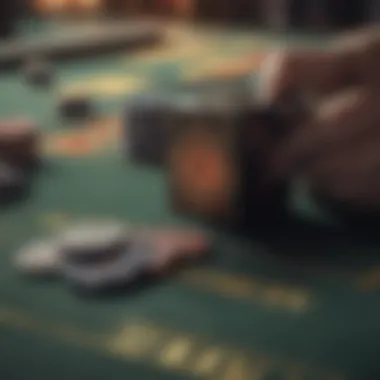Gambling in Utah: A Comprehensive Analysis


Intro
In the heart of the West lies Utah, a state often recognized for its breathtaking landscapes and unique cultural narrative. Yet, lurking beneath its serene exterior is a complex tapestry of gambling practices that tend to be obscured by stringent regulations and a prevailing sense of conservatism. Despite laws that restrict traditional forms of gambling, the activities of many Utah residents tell a different story—one filled with underground gaming options and alternative experiences.
This exploration maneuvers through the historical and legal frameworks shaping gambling in the state, alongside the cultural attitudes that influence individuals’ engagement with games of chance. Here, we will consider not only the current legal landscape but also the societal views on gambling, and how these have shifted over time, punctuated by the rising popularity of underground gaming and their socio-economic effects.
Gambling in Utah is anything but a straightforward matter; it’s a veritable labyrinth of rules, cultural perceptions, and evolving practices that reflect a society grappling with its moral compass against the backdrop of a largely disapproving legal framework. This article seeks to offer an insightful view into these intricacies, making sense of how gambling interacts with Utah's rich social fabric. From understanding how residents adapt their interests within the state's legal limitations to the socio-economic implications at play, each facet contributes to a broader comprehension of gambling in this unique region.
Historical Context of Gambling in Utah
Understanding the historical context of gambling in Utah is like peeling an onion; it's multilayered, and each layer reveals significant insights into how the state's current attitudes and regulations were shaped over time. Unlike many states in the U.S. that happen to embrace gambling as a legitimate entertainment option, Utah stands out for its stringent opposition to most forms of gambling. One cannot truly appreciate the present without considering the past, especially in a state with deep cultural and religious narratives as is the case with Utah. The narrative around gambling is not just tied to its legality; it’s enmeshed with the identity of the state and its residents.
Early Gambling Practices
When looking back, early gambling practices in Utah can be traced back to pioneer days. The first settlers, navigating their way through a harsh and unfamiliar land, found ways to entertain themselves. This included games of chance, bartering, and informal wagering among friends and neighbors. It was less of a structured activity and more about social interaction.
For instance, prairie games that were popular included card games and dice games played in the evenings after a long day's work. This was not just a past-time; it often served as a means of forging community ties. Yet, amidst this social gathering, there were also whispers of discontent from religious leaders who viewed gambling as sinful.
As immigrants poured into the region, they brought their own gambling traditions. This resulted in a melting pot of gaming practices, from simple card games like Poker to more elaborate betting on horse races. Even billiards found its place as a favored activity in saloons. To many, it was a fleeting distraction, a way to break the monotony of pioneer life. But this historical backdrop soon faced a shift owing to a combination of religious beliefs and evolving laws.
Legislative Changes Over Time
Shifts in the legal landscape concerning gambling in Utah have been significant over the years. From the late 19th century, as Utah became a state, there was a strong push to curb gambling. The influence of the Mormon Church played a pivotal role in shaping these laws. They fundamentally viewed gambling as morally wrong, pushing legislation aimed at eliminating games of chance.
By the turn of the 20th century, these influences crystallized into more concrete laws. In 1910, the state effectively outlawed gambling entirely, dubbing it contrary to public morality. This legal framework changed little for nearly a century. Despite occasional calls for reform in the midst of changing attitudes in neighboring states, Utah maintained its strict stance.
More recently, the conversation around gambling has opened up due to societal shifts and economic considerations. While discussions about charity gaming and state lotteries occasionally surface, they are often met with staunch resistance. The balancing act between preserving cultural values and acknowledging an evolving economic landscape remains a contentious point in legislation today. This battleground of ideas shapes not only the legal framework but also the broader societal perception of gambling in Utah.
The historical stance on gambling in Utah demonstrates a remarkable intersection of culture, religion, and law—one that continues to influence thought and policy in the present day.
In sum, the historical context tells a compelling story, painting a picture of a state where gambling is viewed not merely as an issue of legality but as a reflection of deeper social and cultural dynamics. Understanding this history is crucial for grasping the complexities of gambling in Utah today.
Legal Framework Governing Gambling
Utah’s legal framework governing gambling stands as a cornerstone that influences not just the activities allowed but also the very perception of gambling in the state. With an intricate tapestry of laws born out of historical, cultural, and religious influences, understanding this legal landscape is paramount for anyone drawn toward the gambling scene, whether as participants or strategists.
Overview of Gambling Laws
In Utah, gambling laws are heavily shaped by the state’s commitment to conservatism. The primary legislative directive can be found in the Utah Code Title 76, Chapter 10 where any form of gambling, except for specific sanctioned activities, is prohibited.
It’s worth noting that this prohibition extends across a wide variety of activities that might seem benign or innocuous in other states. For instance, even betting on a friendly poker night can run afoul of local regulations. The exceptions are few: state-sponsored activities such as the Utah State Lottery and certain charitable games are allowed under strict applications and guidelines.
This legal framework produces a unique environment where residents and visitors must navigate carefully. Many forums, like reddit.com, echo sentiments of frustration among gamblers who find themselves limited in their choices. This creates a tug-of-war between demand for such activities and the legal constraints imposed.
Specific Restrictions and Regulations
The legal landscape in Utah is riddled with specific restrictions that further delineate what is and isn't permissible.
- No Casinos: Unlike neighboring states, Utah does not have any commercial casinos. The notion of ‘gaming’ as a form of entertainment is heavily curtailed, leading to a scarcity of legal options.
- Charity and Raffles: Charitable gaming is the only allowance for engaging in gambling, but even this requires meticulous regulation. Organizations have to jump through numerous hoops to obtain licenses, file reports, and ensure that all proceeds benefit charitable purposes.
- State Lottery: While the lottery is legal, its operations are strictly monitored and participation is bound by stringent guidelines to prevent abuse or exploitation.
- Regulations on Age and Participation: Only individuals over the age of 18 may engage in lottery games, ensuring a safeguard against underage gambling, but also underscoring the overarching cautious approach taken by legal systems.
- Online Presence: With the rise of digital platforms, it’s essential to understand that online gambling is off-limits, and websites promoting unauthorized gambling activities can face legal penalties.
"Gambling is not simply the act of betting; it's interwoven with cultural norms and legal boundaries that shape our choices."
Link to further reading: Wikipedia: Gambling in Utah
Societal Perceptions of Gambling
Gambling in Utah does not merely exist in legal terms; it is woven into the very fabric of society. How people perceive gambling can significantly influence legislation, participation rates, and the general atmosphere surrounding the activity. In this context, societal perceptions remain critical to understanding the dynamics at play. These perspectives shape not only individuals’ attitudes but also community standards and inform policy-makers as they navigate the complex intersection of tradition, law, and modern recreation.
Cultural Attitudes Towards Gambling


In Utah, cultural attitudes towards gambling are deeply influenced by the state’s heritage and demographics. The predominant belief system stems from a blend of Mormon values that often discourage gambling. Many individuals view such activities with skepticism, associating them with negative outcomes like addiction and financial ruin. This typical sentiment often creates a stigma that surrounds gambling activities, pushing them to the periphery of social acceptance.
However, it’s essential to note that not all residents share the same perspective. Some Utahns see gambling as a harmless leisure activity, akin to socializing over a game night or participating in fantasy sports leagues. This stems from a growing acceptance among younger generations, who are more likely to see gambling as a fun escape rather than a moral failing. Consequently, there exists a sort of dichotomy within the community where traditional values collide with evolving social norms.
Local events often feature charitable gaming, and many residents participate in the state-run lottery, suggesting that while general attitudes lean conservative, there is an underlying interest in structured forms of gambling that are socially acceptable.
Religious Influences on Gambling Practices
Religion plays a pivotal role in shaping gambling attitudes in Utah. The Church of Jesus Christ of Latter-day Saints, with its significant influence over state politics and community morals, teaches principles that often discourage gambling. The church casts a wary eye on many activities that involve chance, advocating for self-control and fiscal prudence. Gambling is frequently seen as an activity that can distract from spiritual commitments and foster unhealthy behaviors among followers.
Ultimately, these religious beliefs manifest in Utah's strict gambling laws, leaving little room for casino establishments or widespread gambling practices that can be found in other states. Thus, the limitations imposed on legal gambling create an underground scene that thrives in shadow, highlighting the stark contrast between a community's desire for engagement and its moral constraints.
"In Utah, gambling isn't generally seen just as an escape; it's often painted as a moral failing, which complicates the dialogue surrounding its legal status."
In summary, societal perceptions of gambling in Utah are complex and multifaceted. Cultural norms and religious influences play critical roles in shaping the boundaries of what's acceptable. The interplay of traditional values and modern nuances creates a unique landscape that affects both individual behavior and legislative outcomes, serving as a significant aspect of this discussion.
Forms of Gambling Available in Utah
Gambling remains a contentious topic in Utah, where strict regulations dictate the landscape of gaming activities. Understanding the forms of gambling available in this state offers insight into the cultural, legal, and societal frameworks that shape these practices. Legal avenues such as charitable gaming and state lotteries stand in stark contrast to the underground scene that features poker games and clandestine casinos. Each of these forms serves a distinct purpose, fulfilling the need for recreational activities while navigating complex legal terrains.
Legal Gambling Activities
Within the bounds of Utah law, certain forms of gambling are accepted. These—primarily charitable gaming and the lottery—play a significant role in the community. They provide entertainment and foster a sense of camaraderie and generosity among participants.
Charitable Gaming
Charitable gaming is particularly notable in Utah. It allows nonprofit organizations to host gaming events, often facilitating a wide array of activities that range from bingo nights to raffle drawings. This form of gambling presents a key characteristic of social responsibility. By participating in these games, players directly contribute to community initiatives and philanthropic efforts.
One of the unique features of charitable gaming is its regulatory framework, which mandates that a substantial portion of the proceeds go toward the charitable cause. This ensures that while participants engage in gaming fun, they also support vital social services.
However, while the advantages of charitable gaming are clear, potential disadvantages might arise. Some argue that it can obscure the line between fun and a potential gambling problem, oftentimes attracting individuals who might not engage otherwise. Striking a balance between entertainment and responsibility is essential in maintaining the community's wellbeing.
Lottery
The Utah state lottery, though limited, showcases another legal avenue for gambling. It operates through the sale of tickets for lottery drawings, with a portion of the proceeds funneled back into state programs, particularly education. This lottery is unlike many others across the nation, largely because it operates under stringent guidelines set forth by state law.
The key characteristic of the lottery lies in its simplicity and low barrier to entry. Anyone can purchase a ticket and participate, making it one of the more accessible forms of gambling available. However, the revenues generated from the lottery often raise discussions about reliance on gambling for funding public services.
A particularly unique feature of the Utah lottery is its restrictions; the state does not allow games like instant win scratch-offs. This limitation can be seen as both a disadvantage—as it restricts consumer options—and an advantage, as it keeps the lottery's appeal to a broad audience without delving into more complex gambling avenues.
Underground Gambling Operations
Despite the regulations governing legal forms of gambling, Utah’s underground gambling scene thrives discreetly. Many individuals turn to informal games or clandestine establishments to avoid legal ramifications. This underground aspect significantly contributes to the overall gambling landscape in Utah.
Poker Games
Poker has become one of the most popular forms of underground gambling in Utah. The nature of poker allows for private gatherings among friends and acquaintances, minimizing the chance of legal repercussions. These games often take place in homes or private venues, creating an intimate environment.
A key characteristic of poker games is their social engagement. Players not only rely on luck but also on strategy and skill, which adds layers of complexity to the game. This appeal draws participants who enjoy the competition, camaraderie, and, at times, the financial reward that comes from winning.
However, underground poker games come with their risks. The uniqueness of such games often lies in their unpredictable nature, often lacking fair oversight. This results in potential conflicts among players, something that rarely arises in legal gaming environments.
Clandestine Casinos
Clandestine casinos represent a more structured yet illegal form of gambling in Utah. These establishments, while veiled in secrecy, often offer a range of traditional casino games like blackjack, roulette, and slots. What makes these casinos particularly noteworthy is their ability to cater to a clientele seeking a full-fledged casino experience without stepping outside the bounds of the law.
The main advantage of clandestine casinos is the experience of a vibrant gaming hub, often resembling real casinos located in neighboring states. However, these operations are fraught with issues, such as potential safety risks and legal consequences. Participants could find themselves in precarious positions, as these venues operate outside any legal protections.
Impact of Gambling on Utah's Economy


Understanding the economic implications of gambling in Utah not only draws a clearer image of the state's financial architecture but also sheds light on the ongoing debates and shifting perceptions around this controversial topic. The topic's significance is underscored by the contrasts between the state's stringent laws against most forms of gambling and the persistence of informal betting activities. In such a unique landscape, evaluating the impacts—both positive and negative—provides crucial insights into how gambling, in its various forms, affects local economies, employment rates, and governmental revenue. The importance of this exploration lies in grounding the conversation around gambling within tangible economic outcomes.
Economic Contributions of Legal Gambling
Legal gambling activities in Utah, although limited, contribute in various indirect ways to the local economy. The state allows specific forms of gambling such as charitable gaming and its state-run lottery. Charitable gaming, for instance, while structured, allows organizations to raise funds through raffle and bingo games, pulling in millions for community projects, local charities, and nonprofit operations. Furthermore, the Utah Lottery creates opportunities for revenue through ticket sales, which in turn feeds into state funds allocated for education and infrastructure.
Through these channels, gambling not only serves as a potential source of income for many communities but also strengthens local initiatives that rely on financial backing. Moreover, it generates jobs related to the operation of these games and lotterys, from management to operational staff. Thus, in a way, even within tightly controlled parameters, legal gambling indeed contributes to economic dynamics.
Costs Associated with Illicit Gambling
While legal avenues present benefits, underground gambling operations present a starkly different economic scenario. These illicit activities—like unlicensed poker games and clandestine casinos—carry significant costs that can overshadow their potential benefits. Beyond the direct effects of lost revenues for the state (due to lack of taxation), illegal gambling often contributes to increased crime rates, social issues, and the undermining of local law enforcement efforts.
Individuals involved in these shadowy dealings might face financial ruin or legal consequences, which not only devastates personal lives but can also ripple through communities. These underground operations thrive in the shadows, weakening both the community structure and the trust in legitimate economic practices. The hidden nature of these activities complicates any precise assessment of their overall economic impact, yet it remains clear that the existence of illicit gambling carries a hefty toll on the state's economy and social fabric.
"Illicit gambling may seem like a personal gamble, but it’s a community risk—its effects touch all layers of society."
In sum, the economic landscape concerning gambling in Utah struggles between opportunities for community enhancement through legal channels and significant risks associated with its underground counterparts. The challenge lies not only in understanding these dynamics but also in negotiating a path forward that respects cultural sentiments while also capitalizing on beneficial economic prospects. Understanding this interplay will be vital in tracing the future landscape of gambling in Utah.
Technological Advancements in Gambling
The landscape of gambling has rapidly transformed in recent years, with technology playing a pivotal role in shaping how enthusiasts engage with games of chance and skill. This section examines two crucial aspects of these advancements: the rise of online gambling and the proliferation of mobile gaming applications. Understanding these elements is essential, as they not only impact gambling practices but also reflect broader shifts in societal attitudes and economic activities.
Rise of Online Gambling
Online gambling has emerged as a major force in the gaming industry, creating new avenues for players while challenging existing regulatory frameworks. No longer restricted to traditional settings, gambling enthusiasts can now participate from the comfort of their homes, or on the go, making betting more accessible than ever before.
One key aspect of online gambling is its technical infrastructure. With secure payment systems and encrypted platforms, players can feel safer when placing bets. Light-speed internet has enabled live dealer experiences that replicate the excitement of a casino floor, with real-time interactions and high-quality video streaming.
Some players have even adopted specific strategies to enhance their chances of winning, analyzing data and employing statistical approaches in their online activities. Consequently, online gambling has attracted a diverse population, including those who might have shied away from conventional gambling environments.
However, this shift also raises important questions about regulation and oversight. States grapple with how to manage and tax this rapidly evolving industry, and Utah is no different. As the online gambling market continues to expand, legislators may find themselves at a crossroads, balancing consumer protection with economic opportunities.
"The potential for online gambling to reshape the industry is vast, challenging traditional norms and providing new challenges for regulatory bodies."
Mobile Gaming Applications
In tandem with online platforms, mobile gaming applications have redefined gambling accessibility. With most individuals possessing smartphones, the ability to gamble anytime and anywhere is a game changer. Users can download applications from app stores, offering a frictionless entry point into various gaming experiences.
Mobile apps highlight a few key benefits:
- Convenience: Players can access their favorite games while commuting, waiting in line, or simply lounging at home, leading to an increase in gambling frequency.
- Diverse Options: Many mobile apps offer a range of games like slots, poker, and sports betting, catering to various preferences all within a single platform.
- Social Features: Some applications incorporate social elements, allowing players to connect with friends, share achievements, or compete against one another, enhancing user engagement.
Despite these advantages, mobile gaming is not without its own issues. Concerns over addiction and responsible gaming practices have surged as studies highlight the potential for increased gambling behavior among mobile users. Gamblers in Utah, at times restrained by strict local laws, may find themselves navigating this digital landscape in search of more freedom.
As mobile technology progresses, industry standards continue to evolve. Developers are now focused on creating applications that comply with regulations but also work towards ensuring a safer gambling environment through various responsible gaming tools and resources.
In summary, technological advancements such as online gambling and mobile applications are altering the gambling scene in Utah and beyond. As this realm expands, so too must the discussions surrounding regulation, societal impact, and user responsibility.
Responsible Gaming Practices
Responsible gaming is not just a set of best practices, but a philosophy that underpins the entire gambling experience. In Utah, where gambling is heavily scrutinized and regulated, responsible gaming practices stand as a beacon for both regulators and players, ensuring that enjoyment does not turn into harm. Recognizing the potential risks associated with gambling, these practices aim to foster a safe environment, encouraging players to engage in gambling activities with awareness and self-regulation.
Promoting responsible gambling also serves to diminish the stigma often attached to gambling. It’s about creating a conversation that acknowledges the fun of gaming while also addressing its potential pitfalls. The goal is to develop informed participants who recognize their limits, understand the risks, and make educated decisions. This promotes not only individual well-being but also a healthier community overall, reducing the social costs associated with problem gambling.
Promoting Awareness and Education
Awareness is the first step in cultivating responsible gaming practices. In Utah, various organizations and local governments engage in educational campaigns that aim to inform the public about the realities of gambling. These initiatives often include workshops and seminars that focus on:
- Identifying risky behaviors: Participants learn how to spot early signs of problem gambling.
- Understanding odds and risks: Knowledge about the actual chances of winning helps temper unrealistic expectations.
- Setting limits: Providing tools—such as budgeting apps—encourages players to establish personal limits before diving into a gambling session.


"Knowledge is power; if one can understand the landscape of risks involved, one can navigate through it wisely."
A significant part of these education efforts involves outreach to schools and communities. Making responsible gaming education part of youth programs helps instill these values early on. This proactive approach not only cultivates a culture of responsibility but also raises a generation of more conscious gamblers.
Support Systems and Resources
For responsible gaming practices to be truly effective, there must be robust support systems in place. In Utah, a mix of governmental and non-governmental organizations works tirelessly to provide resources to those who may need it. These resources include:
- Hotlines and Counseling Services: 24/7 support hotlines are available for individuals who need immediate assistance or just someone to talk to about their gambling behaviors.
- Support Groups: Local support groups offer a safe space where individuals can share their experiences, fostering a sense of community and understanding.
- Self-Exclusion Programs: Players have the option to voluntarily exclude themselves from gaming activities if they feel they are losing control. This can be an effective tool for those who recognize their struggle but need a safety net.
These systems are designed to empower individuals. They embody the ethos of responsible gaming, turning support into an accessible lifeline. By combining education, awareness, and support, Utah aims to create a gambling environment where fun, enjoyment, and responsibility coexist harmoniously.
Recent Trends in Utah's Gambling Scene
The gambling landscape in Utah is not static but rather shaped by shifting cultural currents and evolving public sentiments. Understanding these recent trends is vital, as they provide insights into how gambling is perceived and engaged with by the community. In light of these changes, stakeholders like gamblers, casino players, and even policymakers must pay attention to new dynamics that could influence the future of gambling in this state.
Shifts in Public Opinion
Public perception of gambling in Utah has witnessed notable transformations in recent years. Traditionally viewed through a lens of conservatism, the tides are turning as more people engage in discussions about the potential benefits of regulated gambling. Polls have shown a gradual increase in support for certain forms of gambling, particularly as the economic implications of legalization become more apparent. This shift can be attributed to several factors:
- Economic Opportunity: The conversation around job creation and tax revenues derived from gambling-related activities is gaining traction. Many residents recognize that regulated gambling could bolster the local economy.
- Social Acceptance: As society progresses, the stigma associated with gambling is starting to soften. Younger generations, in particular, exhibit a more relaxed attitude towards gaming, viewing it as a form of entertainment rather than vice.
- Enhanced Awareness: The rise of information-sharing platforms like Reddit and Facebook has allowed for discussions that break down barriers. More people are able to share personal experiences and anecdotal evidence of legalized gambling's potential benefits versus harms.
"The growth of online discussions has sparked an openness that wasn’t there before—we’re seeing a populace that’s more informed and engaged."
This evolving public opinion not only influences informal conversations but may soon push legislators to reconsider the state’s gambling laws, leading to change in the regulatory framework governing such activities.
Emerging Forms of Entertainment
Alongside the shifts in public attitude, new forms of entertainment are also taking root in Utah’s gambling culture. This emergence is propelled by various factors, including technological advancements and creative innovations tailored to engage a broader audience. Here are some noteworthy developments:
- Fantasy Sports Leagues: While there are still regulations in place, fantasy sports have gained a significant foothold. Utahns are increasingly participating in leagues, enjoying the thrill of competition without some of the penalties associated with traditional gambling.
- Social Gaming Platforms: Broadly accessible online gaming environments are popular among younger users. These platforms enable social interaction while allowing for skill-based competition, which can create a sense of community.
- Esports Betting: With the rise of competitive gaming, there’s a growing interest in esports wagering. Gamblers and gaming enthusiasts are keenly watching how legal frameworks may accommodate or restrict this emerging trend.
- Skill Games: These games, which blend elements of chance and skill, are making their way into certain venues across Utah. They are attractive because they provide a gambling experience while allowing players to exert some control over their outcomes.
The diversification of gambling formats signals a pivotal moment in Utah’s gaming culture, indicating that residents are looking for more versatile and interactive ways to engage with gambling, possibly leading to broader acceptance and future legislative considerations.
In summary, the recent trends in Utah's gambling scene reveal a gradually shifting landscape influenced by changing public perception and innovative entertainment options. These dynamics are essential for understanding what the future may hold for gambling in Utah and how it may evolve into a more socially accepted aspect of life.
Future of Gambling in Utah
The future of gambling in Utah presents a complex interplay of evolving societal norms, potential legislative shifts, and the influence of technological innovations. Given Utah's historical resistance to broad gambling practices, this topic is not merely an academic inquiry; it is a pertinent discussion for stakeholders. Moving forward, understanding the potential landscape of gambling can help illuminate issues related to regulation, public welfare, and economic implications.
Recent discussions have started to center on possible legal reforms. With neighboring states embracing more liberal gambling frameworks, some Utah residents are increasingly vocal about exploring similar options. This reflects a broader societal shift where traditional views are challenged by the practical realities of economic opportunity and personal freedom.
Furthermore, the impact of national trends on Utah policies cannot be overstated. As trends across the United States lean towards legalization and regulation of various gambling forms, Utah's policymakers may feel compelled to reassess their stringent stance. This potential pressure for reform opens avenues for dialogue among investors, local businesses, and residents about the benefits and drawbacks of a more regulated gambling industry.
"The trajectory of gambling legislation is not set in stone; it’s a reflection of the cultural pulse and economic considerations of the time."
In this dynamic environment, Utah's gambling landscape could evolve significantly over the coming years, as both individuals and businesses weigh the pros and cons of more integrated gambling activities against the backdrop of existing practices and societal apprehensions.
Potential Legal Reforms
Discussions about legal reforms regarding gambling in Utah hinge on various factors. Perhaps, one driving force could be the desire for increased state revenue. With persuasive arguments surfacing related to how regulated gambling could bolster state funds through taxation, it becomes a compelling proposition. David from Salt Lake City mentions, "If we can have liquor stores, why not casinos that bring in tax revenue?" Indeed, the economic benefits could be considerable, especially in post-pandemic recovery efforts.
Meanwhile, the emergence of online gambling has drawn attention to alternative forms of regulation that already exist in other states. The rapid rise of mobile apps has shown how digital platforms can transform traditional understanding of gambling, making it more accessible and appealing to a broader audience. This prompts legislators to continually reassess existing laws or consider more progressive frameworks that align with these changes.
Consequently, legal reforms might not only expand existing gambling practices but also introduce stricter regulatory measures aimed at responsible gaming. Such steps could mitigate risks while allowing for a safe environment that could cater to both casual players and serious gamblers alike.
Impact of National Trends on Utah Policies
As other states adjust their gambling regulations and witness varying outcomes—some flattening their economies through well-regulated casinos, while others struggle with the implications of unregulated activities—the implications for Utah are profound. For example, states like Nevada and Colorado have set noteworthy precedents, showcasing how careful regulation can yield positive economic returns without sacrificing community values.
Moreover, national attitudes towards gambling are shifting; what was once a highly stigmatized activity is now becoming ingrained in mainstream culture. States are increasingly recognizing the benefits of legalizing and regulating gambling activities. Sustained pressure from political entities or lobbying groups could catalyze movement in Utah to align its policies with these national trends.
Being aware of these changes could serve as a wake-up call to Utah's policymakers. For instance, laws around sports betting and fantasy leagues have been evolving rapidly nationwide, suggesting that early adoption could place Utah at the forefront of regional gaming. As public sentiment begins to sway toward a more accepting viewpoint on gambling, even conservative leaders may find it necessary to reevaluate their positions and consider how their policies can adapt to both local sentiments and national trends.
Ultimately, the future of gambling in Utah stands at an intriguing crossroads. The dialogue surrounding it promises to shape not only laws but also broader societal values, redefining what gambling means in this unique cultural context.















